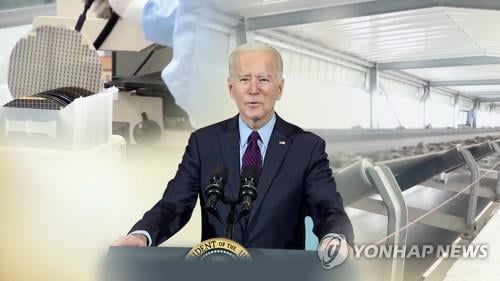It seems to be good for the electric vehicle battery industry that competes with China.
Semiconductors with high dependence on China could be bad news
As Joe Biden’s US administration decides to create a new supply chain for core materials and parts, such as semiconductors and electric vehicle batteries, with allies, domestic parts makers are also keenly keen.
The movement of the U.S. administration remains to be observed, but as a result, Korea can have a great impact on the semiconductor and battery industries, which have a high share in the global market.
On the 25th, there are many observations that the automotive battery industry will be a boon for Korean companies if the US administration decides to reorganize the supply chain to exclude China.

According to the industry, the current electric vehicle battery production plants in the US are all lines of LG Energy Solution and SK Innovation, Panasonic of Japan, and ASEC of China.
For this reason, some automakers in the US are also using batteries such as CATL in China, and if the US restricts imports of Chinese batteries, domestic battery demand may increase.
As demand for electric vehicles in the U.S. is expected to expand thanks to the biden government’s eco-friendly policy drive, it is highly likely that the U.S. will induce the expansion of factories in the U.S. from Korean and Japanese companies excluding China to provide a stable battery supply.
China’s CATL, which is the number one battery supplier, is expanding its investment with the goal of producing 500 GWh (gigawatt hours) by 2025, but it is actually a state-run company in China and has no investment plans in the US.
An official in the industry said, “In the end, domestic companies such as LG Energy Solution and SK Innovation, and Japanese and European battery companies can benefit from reflection.”
However, if the US cuts imports of Chinese-made products and demands that its allies also reduce or stop trading with China, Korean companies will also be hurt.
This is because battery companies such as LG, SK, and Samsung SDI are supplying batteries to Chinese automakers as well as the US and Europe.
Semiconductors are more sensitive.
Once the US strengthens its alliance with Korea in semiconductor supply, there is nothing bad for domestic semiconductor companies.
In particular, cooperation is expected in the foundry (consignment production of semiconductors) of system semiconductors such as central processing unit (CPU) and graphic processing unit (GPU), which the US has strong points.

However, if we block the import of raw materials such as rare earth or ask other Chinese companies to stop supplying semiconductors additionally, it will be a bad thing for Korean companies as well.
According to the Korea International Trade Association, the total exports of domestic semiconductor companies last year amounted to 99.2 billion dollars, of which 40.2% (33.9 billion dollars) of exports to China was large.
Last year, rare earths are also highly dependent on China, with 61% of imports from China.
Samsung Electronics and SK Hynix have already stopped supplying semiconductors to Huawei since September last year due to the Trump administration’s sanctions on Huawei in China.
The industry is concerned that domestic companies, which are both large markets in the United States and China, may face a dilemma that is difficult for either side to side according to the US decision.
In particular, the key is how China will respond to the reorganization of the US supply chain.
An official in the semiconductor industry said, “There are not many countries that can replace Chinese-made rare earths, so there is no possibility of extreme policies such as stopping the import of rare earths made in China or the import of semiconductors produced using China, given the recent shortage of semiconductor supply “It seems to be small,” he said. “The more the dispute between the US and China intensifies, the worse it can be for Korean companies that have become a’sandwich’ between China and the US in the long term.”
/yunhap news
